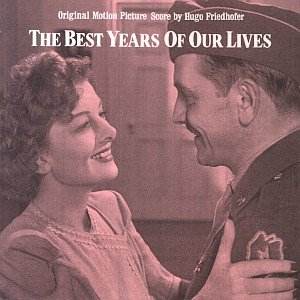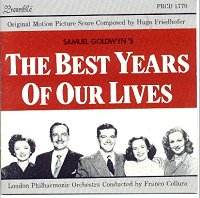| **************************************************************
EDITOR’s CHOICE September 2000
************************************************************** |
Hugo FRIEDHOFER
The Best Years of Our Lives
 Franco Collura conducting the
London Symphony Orchestra with Bob Burns (alto sax).
Franco Collura conducting the
London Symphony Orchestra with Bob Burns (alto sax).
This recording was first released as an analogue LP in 1978, reissued
on CD by Preamble in 1988 and now reissued in a new digital remix by
-
 LABEL X LXCD 14
[46:13]
LABEL X LXCD 14
[46:13]
Amazon
UK

The Editor's comment:-
Since I am reviewing this release for Soundtrack Magazine, I feel
I must leave the detailed comments to my colleague Film Music on
the Web reviewers. I will say, though, that this score is one of my all time
favourites. I saw the film The Best Years of Our Lives with my parents
when I was about eleven. I remember we queued for hours -- the film was immensely
popular. It touched upon a universal and highly topical theme for 1946, the
predicament of the returning ex-serviceman who found readjusting to life
"in civies" just as difficult and hazardous, in its own way, as four-to-six
years of global war.
Hugo Friedhofer, too often remembered as just an orchestrator for better-known
Hollywood greats, such as Korngold and Steiner, was clearly deeply moved
by the screenplay to write his finest work. This is a deeply affecting score
with beautiful, noble melodies that cling in the memory and feel absolutely
right. They are in their way a sort of thanksgiving hymn. And Friedhofer's
'Nightmare' and 'Bomber Graveyard' music for Fred (Dana Andrews) is a
tour de force for music as actor.
If you have never heard this music then I urge you to do so now. Unhesitatingly
top marks.
Ian Lace


Original LP cover design
John Huether adds:-
Hugo Friedhofer wrote a uniquely American score for this, a uniquely American
story. I describe The Best Year of Our Lives that way despite Royal
S. Brown's contention, offered in his liner notes to this excellent Label
X remastering, that the film contains a "we-whipped-the-bad-guys optimism"
from which the composer drew his inspiration.
I beg to differ. Certainly, the satisfaction of victory was felt by citizens
of all allied nations, but I think there was a somewhat different feeling
in this country. Without wishing to sound like a jingoistic Yank, I would
suggest that Americans saw their role in World War II more as a duty to help
than as self-defense. Yes, the attack at Pearl Harbor brought the war home
to us in a shocking, savage manner. But those bombs came no nearer our mainland
than the bombs and rockets that struck London in the blitz. Americans went
to war not out of sense that their families and homeland were directly threatened
by Hitler, but out of a sense of duty to help others who were so threatened
or, worse, already enslaved. Put simply, it was a job that needed to be done.
And when the job was over, they returned -- businessmen, laborers, farmers
-- proud of having done their duty but now simply hoping to resume their
lives. Part of the realism that director William Wyler and screenwriter Robert
Sherwood achieved in "The Best Years" lies in the film's very lack of
chest-thumping, tough-guy swaggering.
For his part, Friedhofer begins his score with a broad, gently uplifting
main theme that speaks, in a subtly ennobling way, of the great American
heartland to which the story's three main characters are returning. The theme
for Boone City -- located somewhere near the intersection of Gershwin and
Copland -- emphasizes their optimism. But the happy promise of peacetime
soon gives way to doubts as the difficulty of adjustment becomes clear. Notice
how Friedhofer utilizes his main theme several times in connection with the
hooks that have replaced one of the character's hands. The point is clear:
The country our soldiers came home to is the same, but their lives have been
forever changed. (Wyler himself was personally aware of this: Accompanying
B-17 bombing runs over occupied Europe to make his classic war documentaries,
he suffered permanent ear damage that, for a time, sent him into a deep despair.)
Without question, this is Friedhofer's most melodic score, with themes for
at least three maim characters (Homer, Peggy and Wilma) as well as themes
denoting feelings ('Neighbors') and place (the aforementioned 'Boone City.')
Part of the score's success stems from its delicate intermingling of these
various themes throughout various scenes as characters interact, emotions
shift, and the drama unfolds. Through his music, Friedhofer helps join the
many disparate characters in their common experience.
No review of this score is complete without reference to the starkly
impressionistic music Friedhofer wrote for the Fred Derry (Dana Andrews)
character, an Army Air Force officer who relives a harrowing bombing mission
while perched in the nose of a surplused bomber. A first viewing of the film
readily suggests special sound effects, but none was used. It's all Friedhofer
as the plane's engines rumble awake, and enemy machine gun fire rakes the
glass nose bubble where Derry sits. It's a bravura musical achievement, made
even more effective because much of it is based on material Friedhofer already
has introduced in a previous scene involving Derry ('The Nightmare.')
The Best Years of Our Lives may have been producer Sam Goldwyn's greatest
film, and it's no surprise that his choice to score it wasn't Friedhofer.
Alfred Newman, who had scored Wuthering Heights for Goldwyn and Wyler, was
their first pick, but he recommended Friedhofer. "I got the job even though
William Wyler and others didn't want me," Friedhofer told Goldwyn biographer
Scott Berg. Although long rated among the greatest Hollywood scores ever
written, it wasn't recorded until John Lasher offered it on LP on the Entr'acte
label in 1979 - more than 10 years after Lasher first approached the composer
about reworking the score into a suite for symphony orchestra. Now, two decades
later, Lasher continues to improve on the initial recording with this remixed
and remastered CD. One quibble: While the liner notes by Brown (discussing
the film's production history) and by Page Cook (focusing on Friedhofer)
are informative, I would have liked to know more about the conductor, Franco
Collura (a native of Buffalo, N.Y., he's just Frank on the LP's credits)
and the recreation of the score itself which, performed by the London
Philharmonic, is one of the finest full-score recreations I've ever heard.
John Huether

And Jeffrey Wheeler sent me this communication:-
Dear Ian,
You mentioned to me awhile back that Hugo Friedhofer's score for "The Best
Years of Our Lives" is one of your favorite film scores. Now I cannot imagine
how a fan of orchestral film music would disagree! Here I am, listening to
the CD re-mastering and re-issue of it for the umpteenth time. It is tremendously
beautiful, sounding impossible to upbraid. While not Friedhofer's own, original
filmusic recording, which I wish we could hear (being something of a completist),
I think Franco Collura and the London Philharmonic did an appreciable job.
Re-recordings are tough now, so I have no doubt that they were over 20 years
ago.
Friedhofer's music signifies extraordinary emotion from a past age. His work
with Korngold, Steiner and others is distinguished; no film critic could
mistake his scholarly precision flavoring the instrumentation. It seems that
in the present, the mention of Hollywood's Golden Age film scores prompts
thoughts of unison, cookie-cutter string sections and sappy melodies. "The
Best Years of Our Lives" sets itself apart from the generalized view as any
other truly classic score... The orchestrations further established a dramatic
standard that a precious number of film composers emulate to this day. The
'Homecoming' exposition is especially theatrical. The 'Fred and Peggy' blues
motif, nicely performed by Robert Burns on alto saxophone, confirms the score
as one about relationships on various levels. Throughout the score, the romance,
the dissonance, and the blues mingle in an ideal union of tradition and
invention. Recall Friedhofer's noble main theme - a cynosure of the period,
a classic, insuperable in its kind. Music is a perfect vessel for philosophy,
music itself is a philosophy, and beyond the drama the composer gives us
thought. It 'works' like a stunning symphony.
There is not much to say that has not been said already, whether here or
in the release's multifarious sleeve notes by Royal S. Brown, the late Page
Cook, and soundtrack producer John Steven Lasher. "The Best Years of Our
Lives" garners every particle of that insight and every ounce of that praise
with worthiness.
Thanks and regards,
Jeffrey Wheeler

While Paul Tonks contributes:-
Were a film (most likely for television) like this to be made today, the
score would unquestionably be unbearably saccharin and overly patriotic in
Americana. The tale of Homer Parrish and other WWII vets returning to lives
complicated by their absence is a powerfully emotional one. Hollywood of
the '90s just cannot treat such material today with anything other than tired
cliché both in dialogue and music (for a recent example of how their
'respect' for the period currently works, see U-571…). So thank goodness
this was made when it was relevant (just after the war), and when "Master"
orchestrator Friedhofer could make its emotions resonate realistically.
Winning an Oscar back then meant a little more than it does today, so if
our reviews don't sway you toward believing its quality. For this really
is one of the all-time greats. It's somehow manipulative while unobtrusive,
and mournful yet joyous. It's by no means contradictory in the sense of
incomprehensible as a standalone. But whether to picture or not, this music
performs that double trick of making you feel happy and sad all at once.
It's a strings-heavy piece and that sets a warm tone right from the "Main
Title".
Although a re-release of what made it to vinyl in the seventies, this has
been digitally re-mastered. Collectively, the reviews on this site should
have you rushing to obtain one of the best scores of our lives.
Paul Tonks

A note from Fifth Continent Music
I note that John Huether lamented the lack of info on conductor Franco Collura
and the reconstruction of the score by Tony Bremner. In the former respect
a brief bio follows. You may contact Mr Bremner about the restoration at
3 Dukes Avenue, Finchley N3 2DE.
FRANCO COLLURA was born in Buffalo, New York, USA. After completing his studies
under William Vacchiano, he joined the trumpet section of the Buffalo
Philharmonic Orchestra. In 1968 he assumed a position in the faculty at the
State University of Buffalo. He began conducting studies in 1971 under Charles
Bruck, followed by advanced instruction in Italy under Franco Ferrara (himself,
a noted conductor of music for Italian films). Since 1972 he has appeared
as conductor with the Buffalo Philharmonic, Kansas City Philharmonic and
Santa Barbara Symphony. Guest appearances include the RTO of Sofia (Bulgaria),
Honolulu, Indianapolis and Oakland Symphony Orchestras, among others. In
1978, duputising at the eleventh-hour for an ailing Emil Newman, he was engaged
by the Entr'acte Recording Society to conduct the London Philharmonic Orchestra
in a world-premiere recording of Hugo Friedhofer's legendary score for 'The
Best Years of Our Lives'. A digitally remixed and remastered CD was
released by Fifth Continent Music Classics on Label 'X' through Hot Records
UK to rave reviews.
![]()
![]()
![]()
![]()
![]()
![]()
![]()
![]()
![]()
![]()
![]()
![]()
![]()
![]()
![]()
![]()